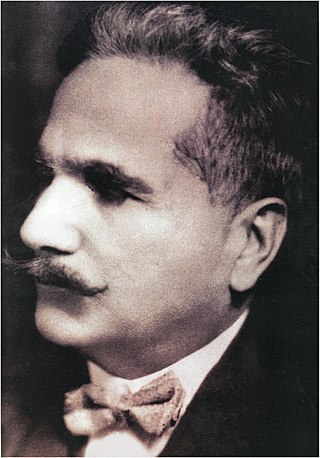
Urdu poetry is a tradition of poetry and has many different forms. Today, it is an important part of the culture of India and Pakistan. According to Naseer Turabi there are five major poets of Urdu: Mir Taqi Mir (d.1810), Mirza Ghalib, Mir Anees (d.1874), Muhammad Iqbal and Josh Malihabadi (d.1982). The language of Urdu reached its pinnacle under the British Raj, and it received official status. All famous writers of Urdu language including Ghalib and Iqbal were given British scholarships. Following the Partition of India in 1947, it found major poets and scholars were divided along the nationalistic lines. However, Urdu poetry is cherished in both the nations. Both the Muslims and Hindus from across the border continue the tradition.

Urdu literature comprises the literary works, written in the Urdu language. While, It tends to be dominated by poetry, especially the verse forms of the ghazal and nazm, it has expanded into other styles of writing, including that of the short story, or afsana. Urdu literature is popular mostly in Pakistan, where Urdu is the national language, and in India, where it is an Eighth Schedule language.
Mehdi Hassan Khan known as Mehdi Hassan was a Pakistani ghazal singer and playback singer. Widely considered one of the greatest and most influential figures in the history of ghazal singing, Hassan is referred to as the "Shahenshah-e-Ghazal". Known for his "haunting" baritone voice, Hassan is credited with bringing ghazal singing to a worldwide audience. He is unique for his melodic patterns and maintaining integrity of the ragas in an innovative way.
Nazar Muhammad Rashed, commonly known as Noon Meem Rashed or N.M. Rashed, was a Pakistani poet of modern Urdu poetry.

Ahmad Nadeem Qasmi born Ahmad Shah Awan was an Urdu language Pakistani poet, journalist, literary critic, dramatist and short story author.
Wazir Agha was a Pakistani Urdu language writer, poet, critic and essayist. He has written many poetry and prose books. He was also the editor and publisher of the literary magazine "Auraq" for many decades. He introduced many theories in Urdu literature. His most famous work is on Urdu humor. His books focus on modern Urdu poets, notably those who have written more poems instead of ghazals. Agha's poems have mostly an element of the story.

Mir Muhammad Taqi, known as Mir Taqi Mir, was a poet, author and literary critic of the Urdu and Persian languages. He was one of the principal poets of the Delhi school of Urdu ghazal and is often remembered as one of the best Urdu poets of all time and one of the pioneers who gave shape to the language. His pen name (takhallus) was Mīr (میر), and he spent the latter part of his life in the court of Asaf-ud-Daulah in Lucknow.
Sher Muhammad Khan, , better known by his pen name Ibn-e-Insha,, was a Pakistani Urdu poet, humorist, travelogue writer and newspaper columnist.
Akhtar Sheerani was an Urdu poet from Pakistan. He was a romantic poet of the Urdu language.

Mir Tanha Yousufi was a Pakistani Punjabi and Urdu writer, best known for his Punjabi literature. He produced two short story collections and five novels in Punjabi. Most of his work was transliterated in Gurumukhi script in Indian Punjab. Besides his Punjabi works, he was a well known Urdu and Punjabi poet.
Nasir Raza Kazmi (Urdu: سید ناصِر رضا كاظمی was an Urdu poet from Pakistan. Kazmi was born on 8 December 1925 at Ambala, Punjab,.
Tina Sani is a Pakistani female singer famous for her classical and semi-classical Urdu Ghazals.
Seemab Akbarabadi born Aashiq Hussain Siddiqui was an Urdu poet from British India and Pakistan.
Waheed Qureshi was a Pakistani noted linguist, literary critic, writer, researcher, educationalist and scholar of Urdu literature and oriental languages. Waheed Qureshi was one of the foremost scholars who helped shape the mood and colour of research on oriental languages and literature.
Haider Qureshi, Qureshi Ghulam Haider Arshad born on 1 September 1953 in Rabwah, Punjab, is a Pakistani Urdu poet, short story writer, essayist, critic, editor and journalist. He writes in Urdu.

Sir Muhammad Iqbal was a South Asian Islamic philosopher, poet and politician. His poetry is considered to be among the greatest of the 20th century, and his vision of a cultural and political ideal for the Muslims of British-ruled India is widely regarded as having animated the impulse for the Pakistan Movement. He is commonly referred to by the honourific Allama. and widely considered one of the most important and influential Muslim thinkers and Western religious philosophers of the 20th century.
Halqa-e Arbab-e Zauq is a Pakistani literary movement begun in Lahore, British Punjab, India on April 29, 1939.

Riaz-Ur-Rehman Saghar was a poet and a film song lyricist active in Pakistani cinema.
Sarmad Sehbai is a Pakistani poet, playwright, film and theatre director, worked in Urdu, Punjabi and English languages.
Zafar Iqbal is an Urdu poet based in Okara, Punjab, Pakistan in Arain family.





